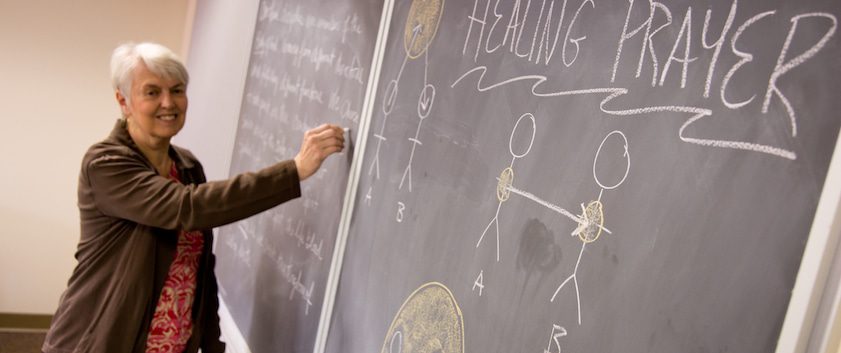Certificates
Do you want to study theology, spirituality and related topics but aren’t ready to commit to earning a graduate degree? Perhaps you’re interested for vocational reasons, personal development or to expand your opportunities for ministry?
ESR’s certificate programs balance academic rigor with spiritual formation and provide opportunities to engage in studies while earning credit that can be applied to a future graduate degree.
ESR’s non-degree Occasional Student Program offers you a chance to explore seminary courses without the commitment to a full-time program of study.

Certificate programs
ESR’s certificate programs combine foundational classes with specialized courses that deeply explore areas of concentration. You can choose from residential, intensive, online or hybrid residential/online courses to fulfill certificate requirements. These flexible yet rigorous programs can support vocational or ministry goals or serve as an interim step toward a degree program.
CERTIFICATE PROGRAM FAQs
The certificate cost is 25 percent discount on regular tuition of $600 per credit hour (most certificates are 18 credit hours) plus semester fees (approximately $350 per semester). Non-degree students pursuing a certificate are not eligible for Title IV funds (Federal Student loans and grants), but may be eligible for ESR need-based scholarships.
Yes! Certificate students enrolled in a degree program at one partner school (ESR or Bethany) may earn a certificate at the other partner school (ESR or Bethany) without going through the complete application process as a certificate student at the other institution. To do this, you must complete a simple form, which will be counted and processed appropriately.
During the typical process for graduation, you must complete the Intent to Graduate form in order to be awarded the physical certificate and be recognized during commencement.
You may count the certificate courses toward your degree, as per the policy of the school granting the degree. Transcripts will reflect both the degree from the home institution and the certificate from the partner school. The courses that apply to the certificate will be indicated on the transcript. Graduates with a certificate from the partner school will be announced at commencement exercises and included in the printed program.
INTERESTED IN TAKING OCCASIONAL COURSES?
We understand that not every student is able to commit to a full-time program of graduate study, but that shouldn’t be a constraint if you’re interested in taking seminary courses for professional or personal reasons. This is why we provide the option of applying for admission to our Occasional Student Program and registering for residential or Access classes.
As an Occasional Student, you may take any ESR 100 or 200 level course, or if you have the appropriate educational background, you may take 300 level courses with the permission of the instructor. Occasional students may take as many as two courses per semester.
Please note that students in this program are subject to the same academic performance requirements as M.Div./M.Min., M.A. and Certificate students.
Not looking to obtain credit? You can also ask us about the option to audit a class.
Next steps
Ministry isn’t just a vocation or a calling—it’s a way of being in this world, seeking to make it whole. ESR is ready to support you in answering your own call to ministry, whatever shape it takes.